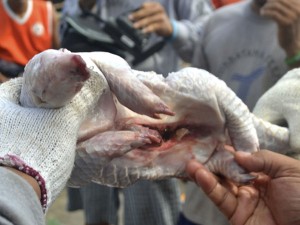DFA tells China off on jailed Chinese poachers

In this April 13, 2013, photo released by the Philippine Coast Guard in Manila, members of the Philippine Coast Guard hold a frozen pangolin, or scaly anteater, on board a Chinese vessel that ran aground off Tubbataha coral reef. AP PHOTO/PHILIPPINE COAST GUARD
MANILA, Philippines—Let the Philippine justice system take its course in the litigation of the Chinese fishermen whose boat got stuck on Tubbataha Reef last week, the Department of Foreign Affairs (DFA) has told Chinese Embassy officials in Manila.
DFA spokesman Assistant Secretary Raul Hernandez said embassy officials led by Deputy Chief of Mission Bai Tian met with Foreign Assistant Secretary for Consular Affairs Jaime Victor Ledda on Monday to discuss the grounding of the Ming Long Yu and the arrest of its 12-man crew.
Ledda is co-chairman of the National Committee on Illegal Entrants, Hernandez said.
“They came to the department to discuss the matter. We told them about the process and that the case was now in the courts and we have to observe due process,” said Hernandez in a press briefing on Tuesday.
The Chinese fishermen are detained at the Puerto Princesa City jail. They face charges of poaching and violation of Tubbataha Reefs Natural Park regulations.
The Ming Long Yu ran aground on a portion of the reef around 11:40 p.m. on April 8, just 1.1 nautical miles east of the park’s ranger station.
The incident occurred one week after the United States completed the piecemeal removal of the USS Guardian, a US Navy minesweeper that ran aground at Tubbataha on Jan. 17.
Wildlife officials, meanwhile, are trying to determine if the hundreds of pangolin, or scaly anteater, carcasses found on the Chinese vessel were a local species.
Theresa Mundita Lim, director of the Protected Areas and Wildlife Bureau (PAWB), said she was alarmed by the report that some 400 boxes each containing five to six dead pangolin were discovered aboard the Ming Long Yu.
“That’s a big number. Even if the pangolin are not Philippine species, it doesn’t matter because pangolins are considered threatened species, and the fishermen are still liable for violations under the CITES (Convention on the International Trade in Endangered Species of Wild Fauna and Flora),” she said.
Lim said she would lead a PAWB team to Palawan on Friday to check if the carcasses of “dressed or rolled-up” pangolins were Philippine pangolin or Manis culionensis, a species endemic to Palawan.
“We will try to identify them based on their exterior, that is, if it’s still possible in their condition,” she said.
Pangolins are scaly mammals that look like “slothlike olive lizards” and range throughout Asia and Africa, according to World Wildlife Fund-Philippines.
“Eight species exist—all threatened by habitat loss plus the illegal trade for their meat and unique scales, which are used for both traditional medicine and the curio trade,” WWF-Philippines said in a statement.
“It’s bad enough the Chinese illegally entered our seas, navigated without papers and crashed recklessly into a national marine park and World Heritage Site,” said WWF-Philippines vice chairman and CEO Jose Ma. Lorenzo Tan, “it is simply deplorable that they appeared to be posing as fishermen to trade in illegal wildlife.”